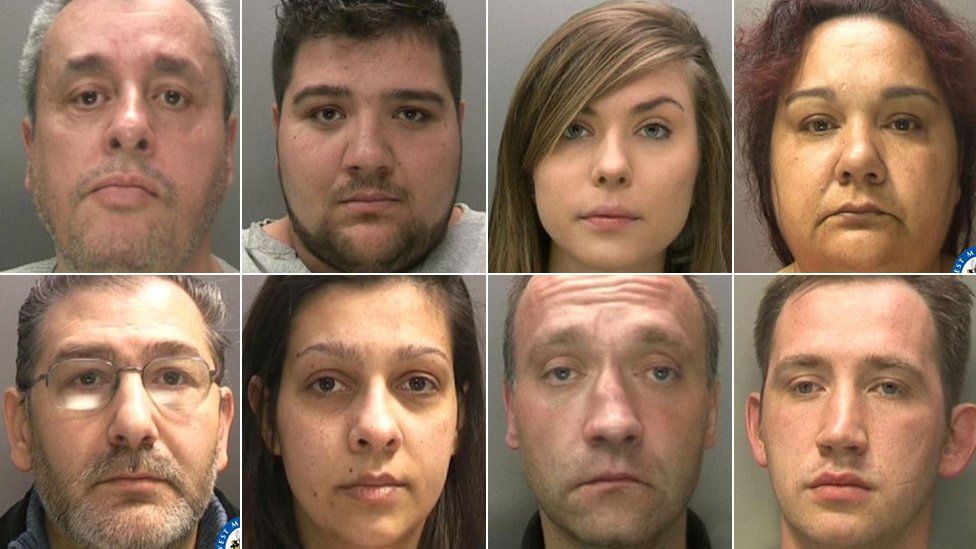UK slavery network 'had 400 victims'
- Published

Members of a gang behind the biggest modern-day slavery network ever exposed in the UK have been jailed.
Police believe more than 400 victims were put to work in the West Midlands by the organised crime gang.
They tricked vulnerable people from Poland into England with the promise of work and a better life.
But their victims were made to live in rat-infested houses and work menial jobs, it can now be reported after reporting restrictions were lifted.
Eight offenders, who police say are members and associates of two Polish crime families, have been jailed after being convicted in two separate trials of crimes including trafficking, conspiracy to require another to perform forced labour and money laundering.
Their sentences range from three to 11 years.
The network collapsed when two victims fled their captors in 2015 and told slavery charity Hope for Justice of their ordeal.
Miroslaw Lehmann, 38, was tricked into coming to the UK from Poland with the promise of a job
The group of five men and three women targeted the most desperate from their homeland, including the homeless, ex-prisoners and alcoholics.
They were transported to the UK by bus, but when they arrived they were housed in squalid homes around West Bromwich, Smethwick and Walsall, forced to sleep up to four in a room on filthy mattresses and had their wages "farmed" from bank accounts on payday.
One victim said he had to wash in a canal because he had no access to water.
The slaves were made to work long days at rubbish recycling centres, farms and turkey-gutting factories and given as little as £20 a week by their captors.
But they were marched to banks and made to open accounts the gang had complete control over.
The gang also claimed benefits in the names of some of their oblivious victims, who ranged in age from 17 to a man in his 60s.
One of the victims died while in captivity, and the gang removed all his personal belongings and identity documents so their plot could not be discovered.
It is estimated the gang made more than £2m between June 2012 and October 2017, which allowed them to lead a lavish lifestyle.
If any victims complained, gang enforcers would humiliate, threaten or beat them.
One victim was stripped naked in front of other workers, doused in surgical chemical iodine, and told that the gang would remove his kidneys if he did not keep quiet.
Judge Mary Stacey said it was clear slavery still continued in the UK "often hiding in plain sight".
The convictions and sentences in full
Marek Chowaniec, 30, of Walsall, and Marek Brzezinski, 50, of Tipton, West Midlands, were jailed for 11 and nine years respectively for trafficking, conspiracy to require another to perform forced labour and money laundering.
Justyna Parczewska, 48, of West Bromwich, and Julianna Chodakowicz, 24, of Evesham, Worcestershire, were jailed for eight and seven years respectively for conspiracy to require another to perform forced labour and money laundering.
Natalia Zmuda, 29, of Walsall, got four years and six months for trafficking, conspiracy to require another to perform forced labour and money laundering.
Ignacy Brzezinski, 52 of West Bromwich, Jan Sadowski, 26, also of West Bromwich and Wojciech Nowakowski, 41, of Winson Green, Birmingham, were all convicted of trafficking charges, conspiracy to require and control another person to perform forced labour, and conspiracy to acquire, use and possess criminal property.
Brzezinski - who remains on the run - was jailed in his absence for 11 years, Sadowski for three years and Nowakowski for six and a half years.
Police said Chowaniec was the "respectable face" of the gang, playing a convincing role in banks and employment agencies. Ignacy Brzezinski - who absconded during his trial while wearing an electronic tag - was in charge of the bank accounts and wages.
Marek Brzezinski travelled to Poland to recruit victims, while Parczewska - the wife of Ignacy Brzezinski - was described by police as having a "matriarchal role, welcoming new arrivals and making them cups of tea and food at her home but knowing full well what horrors lay ahead".
They even had an insider at a Worcester employment agency - Chodakowicz - who signed up dozens of the victims.
Nowakowski and Sadowski met the arrivals in the UK while Zmuda escorted them to job centre appointments and controlled bank accounts.
The judge at Birmingham Crown Court described their trafficking conspiracy as the "most ambitious, extensive and prolific" modern-day slavery network ever exposed in the UK.
Ch Insp Nick Dale, who led Operation Fort, said it had been a "really complex investigation" over four years.
Det Ch Insp Nick Dale urged members of the public to help spot slavery victims
A total of 92 victims were identified but police believe at least 350 more were used by the gang and either could not be traced, had left the country or were too scared to give evidence.
"This was trafficking and exploitation on a massive scale; this gang treated these people, their fellow countrymen, as commodities purely for their own greed," Ch Insp Dale said.
"What they did was abhorrent: they subjected victims to a demi-life of misery and poverty. They forced them into work and, if they objected, they were beaten or threatened with violence and told family members back home would be attacked.
"Some were told they would be taken to the woods to dig their own graves. One man who had an accident at work was forced back to the factory and denied hospital treatment, leaving him with long-term damage to his arm."
Follow BBC West Midlands on Facebook, on Twitter, and sign up for local news updates direct to your phone.
- Published5 July 2019
- Published5 July 2019